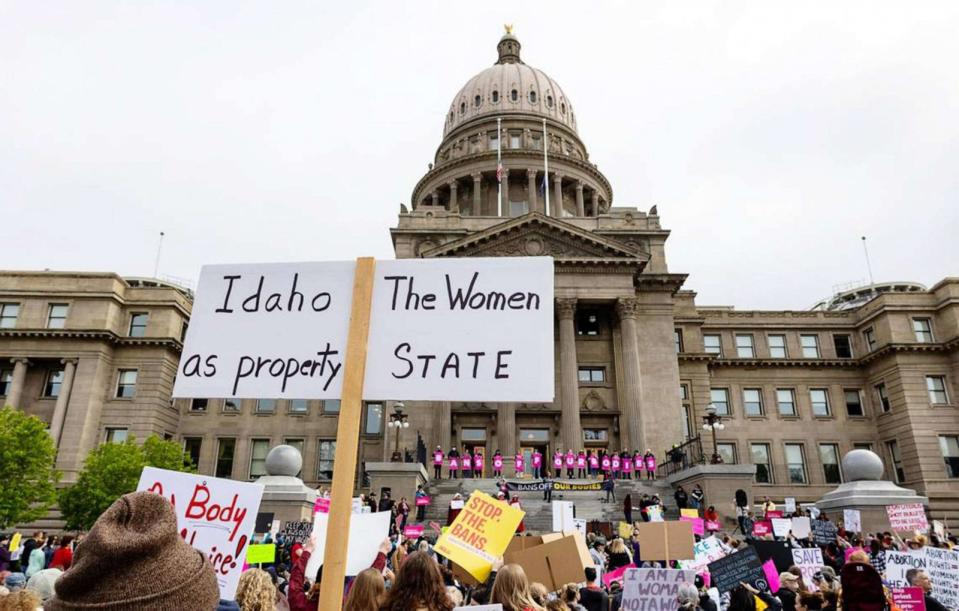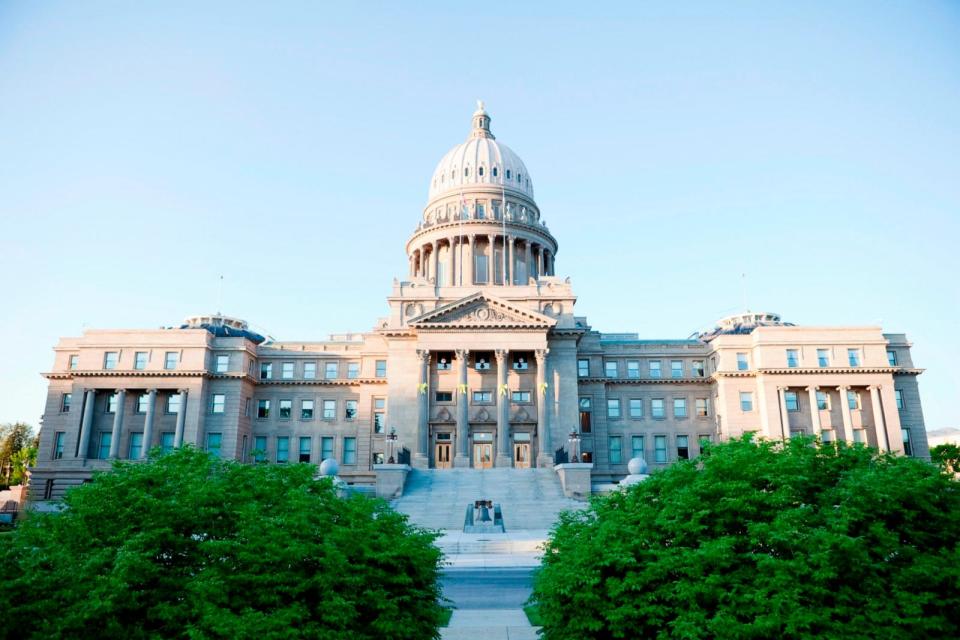Supreme Court fractured over Idaho ban and emergency abortion access
- Oops!Something went wrong.Please try again later.
- Oops!Something went wrong.Please try again later.
- Oops!Something went wrong.Please try again later.
- Oops!Something went wrong.Please try again later.
The U.S. Supreme Court on Wednesday, for the first time since overruling Roe v. Wade, considered the scope of a state abortion ban and whether a federal law governing emergency care protects access to abortion at hospitals when a woman's health is at risk.
Idaho's Defense of Life Act, which took effect in August 2022, prohibits nearly all abortions, with exceptions for reported cases of rape or incest or when "necessary to prevent the death of the pregnant woman."
The Biden administration sued the state, claiming its law conflicts with the Emergency Medical Treatment and Labor Act (EMTALA) of 1986, which requires emergency room physicians at hospitals that receive Medicare funds to offer "stabilizing treatment" to all patients whose health is in jeopardy.
The justices will decide whether EMTALA, which does not specifically address abortion, preempts Idaho's abortion ban and similar measures in 20 other states, protecting a doctor's ability to terminate a pregnancy in an emergency situation if care requires it.
MORE: Emergency rooms refused to treat pregnant women, leaving one to miscarry in a lobby restroom

Abortion rights advocates say critical health care for a narrow category of pregnant women facing tragic and potentially life-altering conditions hangs in the balance in more than a dozen states that have strict abortion bans with limited exceptions.
"No one who comes to an emergency room in need of urgent treatment should be denied necessary stabilizing care. This case is about how that guarantee applies to pregnant women in medical crisis," argued Biden administration Solicitor General Elizabeth Prelogar.
Several Republican-led states, backed by anti-abortion groups, say the case could have sweeping implications for their regulation of medical practices and the ability of legislators to set policy on abortion that reflects the view of their communities.
"Everyone understands that licensing laws limit medical practice. That's why a nurse isn't available to perform open-heart surgery, no matter the need, no matter her knowledge," argued Joshua Turner, the attorney defending Idaho's law. "The answer doesn't change just because we're talking about abortion."
The justices – who did not appear to break cleanly along ideological lines – grappled with a series of overlapping factual and legal disputes surrounding Idaho's Defense of Life Act and its exceptions.
The court's liberal wing – Justices Sonia Sotomayor, Elena Kagan and Ketanji Brown Jackson – vigorously suggested that the state law conflicts with the EMTALA, which requires emergency room physicians at hospitals nationwide that receive Medicare funds to offer "stabilizing treatment."
"All of these cases are rare, but within these rare cases, there's a significant number where the woman is -- her life is not in peril, but she's going to lose her reproductive organs, she's going to lose the ability to have children in the future, unless an abortion takes place," said Justice Kagan. "Now that's the category of cases in which EMTALA says, my gosh, of course, the abortion is necessary to assure that no material deterioration occurs."
"There is no state licensing law that would permit you -- permit the state to say don't treat diabetics with insulin. Federal law would say, you can't do that," said Justice Sotomayor. "Medically accepted -- objective medically accepted standards of care require the treatment of diabetics with insulin. The medically accepted obligation of doctors when they have women with certain conditions that may not result in death but more than likely will result in very serious medical conditions" is abortion.
Several of the court's conservatives – Justices Clarence Thomas, Samuel Alito and Neil Gorsuch – voiced support for Idaho's law and each state's ability to set its own medical regulations, including what types of treatments should be allowed. EMTALA makes no explicit mention of abortion.
"The statute [EMTALA] imposes on the hospital a duty to the woman certainly and also a duty to the child," said Justice Alito. "And it doesn't tell the hospital how it is to adjudicate conflicts between those interests and it leaves that to state law."
"Nobody's suggesting that the woman is not an individual and she doesn't -- she doesn't deserve stabilization," Alito said.
"The State of Idaho can declare that she cannot get the stabilizing treatment even if she's about to die," shot back Prelogar. "That is their theory of this case and this statute, and it's wrong."
Much of the debate during oral arguments, which stretched two hours, centered on whether there is truly any conflict on the ground in Idaho between state law and EMTALA in practice.
Idaho argues there is no conflict and that women facing emergency situations can receive the care they need, including abortions, if medically necessary.
"I don't know of a condition that is so certain to result in the loss of an organ but also so certain not to transpire with death. If that condition exists, yes, Idaho law does say that abortions in that case aren't allowed," Turner said.
The Biden administration insists women are having to be transferred out of state in precarious health conditions in order to get a medically-necessary abortion.
"Under EMTALA, you're supposed to be thinking about things like, is she about to lose her fertility? Is her uterus going to become incredibly scarred because of the bleeding? Is she about to undergo the possibility of kidney failure?" said Prelogar.
Chief Justice John Roberts and Justices Brett Kavanaugh and Amy Coney Barrett appeared more conflicted about how to resolve the dispute. Each expressed concern about the ability of doctors to perform an abortion if critically needed to protect a woman from serious harm but also wrestled with Idaho's assertion that such options are already in place.
At one point, in a remarkable moment, Justice Barrett – a staunch opponent of abortion – exclaimed that she was "kind of shocked" by Idaho's position that there could be instances when a woman in crisis could be turned away from the procedure subject to "case by case" determinations when it would be the appropriate emergency care.
"I'm kind of shocked actually because I thought your own expert had said below that these kinds of cases were covered," Barrett told Turner, the Idaho attorney. "And you're now saying they're not?"
"No, I'm not saying that," Turner replied.
"Well, you're hedging," Barrett shot back.
"This is a subjective standard," replied Turner.
"But some doctors might reach a contrary conclusion," she continued, and "if they reached the conclusion that the legislature's doctors did, would they be prosecuted under Idaho law?"
"That, Your Honor, is the nature of prosecutorial discretion," Turner answered.
Justice Kavanaugh, a critical swing vote in most of the court's highest profile cases, also wrestled openly with an apparent desire to make sure women could be protected.
"Idaho is representing … that, as I count it, nine conditions that have been identified by the government where EMTALA would require that an abortion be available, an abortion is available under Idaho law," he said to Prelogar.
"It certainly isn't happening on the ground," she replied. "The problem with my friend's theory that Idaho law would permit [emergency abortions] is that you just can't square it with the text of the statute."
The administration argues the federal law explicitly makes clear that state laws are overridden to the extent they "directly conflict with a requirement" of EMTALA.
"EMTALA requires us as physicians to act in an emergency to preserve health – even the health of an organ system, like the reproductive system, as one example," said Dr. Jim Souza, chief physician executive at Idaho's St. Luke's Health System. "Idaho's law only allows action to save life, not preserve health."
Idaho contends that Congress enacted EMTALA solely to prevent hospitals from turning away indigent patients or otherwise discriminating against patients on the basis of their condition or status.
"EMTALA leaves the question of specific treatments for stabilizing care to state law," Idaho told the court in its brief. "Indeed, EMTALA treats medical emergencies faced by the unborn child of a pregnant woman no differently than emergencies faced by the mother herself."
The state also argues that the Supreme Court's 2022 decision in Dobbs v. Jackson Women's Health – overturning constitutional protection for abortion – explicitly returned the issue to the states. It accuses the Administration of trying to "reimpose a federal abortion requirement."
"The purpose of the law is to protect the life of mothers and their unborn children," said Dr. Ingrid Skop, a Texas-based OBGYN and vice president of the Charlotte Lozier Institute, an anti-abortion rights group. "All states allow doctors to use reasonable and good faith judgment on when to intervene. Abortion is rare, if ever, necessary" in an emergency.
MORE: Supreme Court allows Idaho to enforce ban on gender-affirming care for minors

The stakes in the case are significant.
"If the court sides with Biden, it would be incredibly troubling and a sweeping precedent for them to set," said Katie Daniel, state policy director for SBA Pro-Life America.
Major American medical organizations have warned that state abortion bans without exceptions for a pregnant woman's health could lead some women to experience lasting harm.
"Before the law, we practiced medicine to preserve the mom's health and future reproductive capability. Since then, there's been a lot of second-guessing and hand wringing," said Souza, "Is she sick enough? Is she bleeding enough? Is she septic enough for me to do an abortion and not go to jail or lose my license?"
Hospital groups have reported increased difficulty hiring OBGYNs and emergency room physicians in states like Idaho because of potential liability from strict abortion laws with few exceptions.
"This case could radically alter how emergency medicine is practiced in this country," said Alexa Kolbi-Molinas, an ACLU attorney supportive of abortion rights.
"For nearly 40 years, EMTALA has required every hospital with an emergency department that takes Medicaid funds to provide stabilizing treatment to any individual who needs it regardless of where they live," she said. "No state law can force hospitals to provide a lesser standard of care. But now the court is deciding whether states can override that."
A decision in the case is expected by the end of June.
Supreme Court fractured over Idaho ban and emergency abortion access originally appeared on abcnews.go.com

